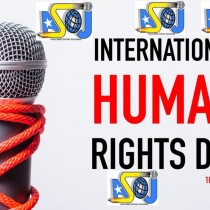ALSO IN THE NEWS

Somalia Journalists unlawful detention and targeted assassinations.
In marking International Human Rights Day 2021, the ASSOCIATED SOMALI JOURNALISTS ASOJ is deeply alarmed that human rights violations in the country remain deeply widespread and pervasive. This is particularly glaring when observing that media freedoms, including that most central of other fundamental rights – the freedom of expression – are being relentlessly curtailed by targeted attacks, harassment and assassinations of journalists.
Certain historical policies and pieces of legislation not aligned to a human rights framework, are being used as weapons to criminalise journalism. Examples of these include the recently-enacted amended media law and the Penal Code of Somalia that are friendly being used to silence independent media organisations and journalists, and significantly restrict freedom of expression and to the right of access to information. These legal frameworks provide Federal Member States with overly broad powers to arbitrarily arrest, detain and charge journalists with vaguely-worded offences. In some cases, journalists are detained for days without charges as has been clearly witnessed this year in Puntland and Galmudug.
The injustice of these acts is exacerbated by the knowledge that they are carried out in a climate of impunity in Somalia. The failure to hold perpetrators accountability for these crimes, whether government-sponsored or not, sends a dangerous message that the lives and professions of journalists mean little. ASOJ is continuing to advocate for faster and more meaningful action for the crimes against journalists in 2021 – two murders and more than 30 journalists arrested and attacked for staying committed to their professional obligations.
ASOJ is angered and dismayed by the increasing attacks on journalists in Puntland. The union was disturbed to observe the recent raiding and ransacking of the offices of female journalist Habibo Abdi Ibrahim (Habiba Ladan) who works for Somali Broadcasting Corporation (SBC) in Qardho, Karkar Region of Puntland. The armed Puntland Police, without a search warrant, were acting on the orders of Qardho’s District police commander Omar Hiirad Kaatun. Habibo was unharmed as she was not at the office at the time of the raid.
Journalists can never become accustomed or immune to this pattern of abuse and gross human rights violations. The raid against Habibo Abdi Ibrahim came four days after another journalist, Mohamud Abdirisak Osman, popularly known as "Fantastic”, was arrested and kept in detention at Gardo District jail in Qardo by Puntland police. He was detained without charges for 6 days, arrested after the security forces found him recording the voices of women who were protesting the dispute over the sacking of the director of Puntland Security Forces (PSF).
"We condemn in the strongest terms, the pervasive culture of shifting blame to the messenger, whenever there is a political dispute. Journalists have often been turned into soft targets for repression whenever authorities want to conceal embarrassing episodes about their conduct from the public,” said ASOJ Secretary General Dahir Alasow. "Instead of authorities upholding and protecting the safety and security of journalists, a systematic campaign of judicial harassment against journalists is now underway.”
As a result of this climate, several media houses have since been reluctant to cover political events or press releases that denounce the authorities, further leading to a culture of suppression and silence.
In addition to restrictive legislation, other repressive tactics are employed such as putting pressure on the media house to subdue or remove the journalists in question, resulting in the media house maintaining a good "reputation” among authorities.
Somalia has a provisional constitution which adequately guarantees a number of rights such as the rights to free expression, media freedom and access to information in accordance with international standards. However, journalists’ enjoyment of these rights is very limited in practice. Due to fear of murder, arrest, censorship, and persecution, individual journalists and news media organisations often refrain from independently exercising their rights, both online and offline.
Within the current context of delayed elections, these concerns are heightened.ASOJ is aware that these restrictions and unlawful actions threaten the media’s ability to cover the election process independently and professionally. As a result, this will tremendously damage the credibility and transparency of the elections.
"There can be no credible elections in this country where journalists are intimidated to tow the authorities’ line and conceal the facts, and blocked from carrying out their journalistic duties to uncover the truth without being censored,” added Alasow.
On this International Human Rights, ASOJ makes a number of emphatic calls: the disabling and restrictive provisions in the Penal Code of Somalia and the amended Media Law be replaced by progressive sections that will guarantee freedom of expression. These amendments must be in line with international human rights standards. The union calls for authorities and political forces to end their ongoing political, judicial and financial pressure on media houses in view of ending the undue interference.
ASOJ also insists on credible and timely judicial investigations be conducted into cases of attacks and killings of journalists, with a view to bringing suspected perpetrators to justice. The union vows to continue challenging the culture of impunity and call on the Federal government and the federal member states to fulfil their duty of ensuring that citizens and journalists enjoy their rights as guaranteed under the constitution.
Leave a comment
| Copyright © 2009 - 2025 Sunatimes News Agency All Rights Reserved. |
| Home | About Us | Diinta | Reports | Latest News | Featured Items | Articles | Suna Radio | Suna TV | Contact Us |
 0
0 









Somalia Journalists unlawful detention and targeted assassinations.
In marking International Human Rights Day 2021, the ASSOCIATED SOMALI JOURNALISTS ASOJ is deeply alarmed that human rights violations in the country remain deeply widespread and pervasive. This is particularly glaring when observing that media freed